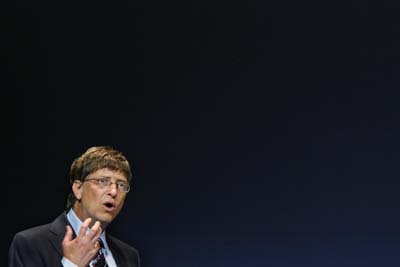Economists Worry China's Economy Will Overheat
Beijing Bling
Economists Worry China's Economy Will Overheat
By SCOTT McDONALD
The Associated Press
The signs of a surging economy are everywhere: flashy luxury cars, glitzy shopping malls, expensive restaurants and construction cranes in many neighborhoods.
For most Chinese, this is a good thing. It means more jobs, higher incomes and rising affluence. But China's leaders, fearful of accelerating inflation and the risk that all this investment could collapse in a debt crisis if borrowers go bankrupt, are trying to apply the brakes.
How well they succeed is taking on an increasing global importance, as a slide in stock prices in Asia and then Europe on Thursday demonstrated. The reaction came after Beijing reported its economy expanded in the first quarter a sizzling 11.1 percent from the same quarter a year ago and that inflation was the highest in two years.
Stocks later stabilized in the United States - unlike the panic selling on Feb. 27 that sent the Dow Jones industrial average plunging 416 points in the worst one-day rout since the Sept. 11 attacks. But the "China effect" on investors around the world remains palpable, due in large part to just how important trade with China has become for most nations.
On Thursday, the State Council in China vowed that it would take steps to keep the economy from overheating. It has said the same thing several times in the past year, to little avail. The economy keeps exceeding growth expectations even though interest rates have been increased three times in the last year and curbs have been imposed on investments in real estate, the auto industry and other fields.
The latest evidence that the restrictions haven't taken hold: Beijing reported Thursday that fixed-asset investment countrywide grew a stunning 23.7 percent during March.
But the real shocker for investors was the news that the consumer price index in March rose 3.3 percent, its highest since hitting 3.9 percent in February 2005. China has said it wants to keep inflation less than 3 percent for the whole year after it increased 1.5 percent in 2006.
It has Chinese economic officials worried.
"If this type of fast growth continues, there is the possibility of shifting from fast growth to overheating. There is that risk," Li Xiaochao, spokesman for the National Bureau of Statistics, said at a news conference.
China's Cabinet also quickly stepped in after the announcements. A statement posted on the council's Web site following a meeting chaired by Premier Wen Jiabao said the government will work to "reduce the country's large trade surplus, limit rapid growth in house prices and maintain basic price stability."
While China's leaders want rapid growth to reduce poverty, they also are trying to slow an investment boom in real estate and other industries where they worry that overspending on unneeded factories and other assets could ignite inflation or a debt crisis.
The news comes amid increased trade tension between Beijing and Washington, with the U.S. threatening to impose punitive tariffs on Chinese goods if it doesn't end currency controls blamed for contributing to the trade gap. Last year, the United States reported a record $232.5 billion trade deficit with China.
Asian markets fell ahead of the report in anticipation that the numbers would be stronger than expected and prompt Beijing to raise interest rates or take other measures to slow growth in China, a major regional trading power.
The nervousness was increased because Beijing delayed the release of the figures by five hours without an explanation.
As it turned out, quarterly gross domestic product did beat forecasts for 10.3 percent growth, according a poll of economists by Dow Jones Newswires. It was the highest growth rate since the second quarter of last year, when growth reached 11.5 percent, the fastest in a decade.
Shanghai's benchmark index - which had set records for most of the last two weeks - tumbled 4.5 percent, while stocks in Japan fell 1.7 percent and those in Hong Kong dropped 2.3 percent. European markets also opened lower.
Economists projected that another rate hike is coming soon.
No forecasts for the full year were given by the statistics bureau, but Stephen Green, chief economist at Standard Chartered Bank in Shanghai, wrote in a report that first-quarter growth was higher than his "bullish expectations" and that he had raised his forecast for 2007 GDP growth to 10.6 percent from 9.6 percent.
The statistics bureau said urban disposable incomes climbed 19.5 percent in the first quarter, while rural incomes went up 15.2 percent, the biggest increase in a decade.
The state-run Xinhua News Agency announced last week that China's foreign reserves, already the world's largest, had climbed past $1.2 trillion, and Li said first-quarter growth in the value of exports was up 27.8 percent, compared with an increase of 18.2 percent in the value of imports.


